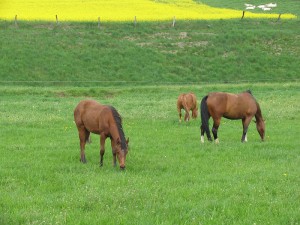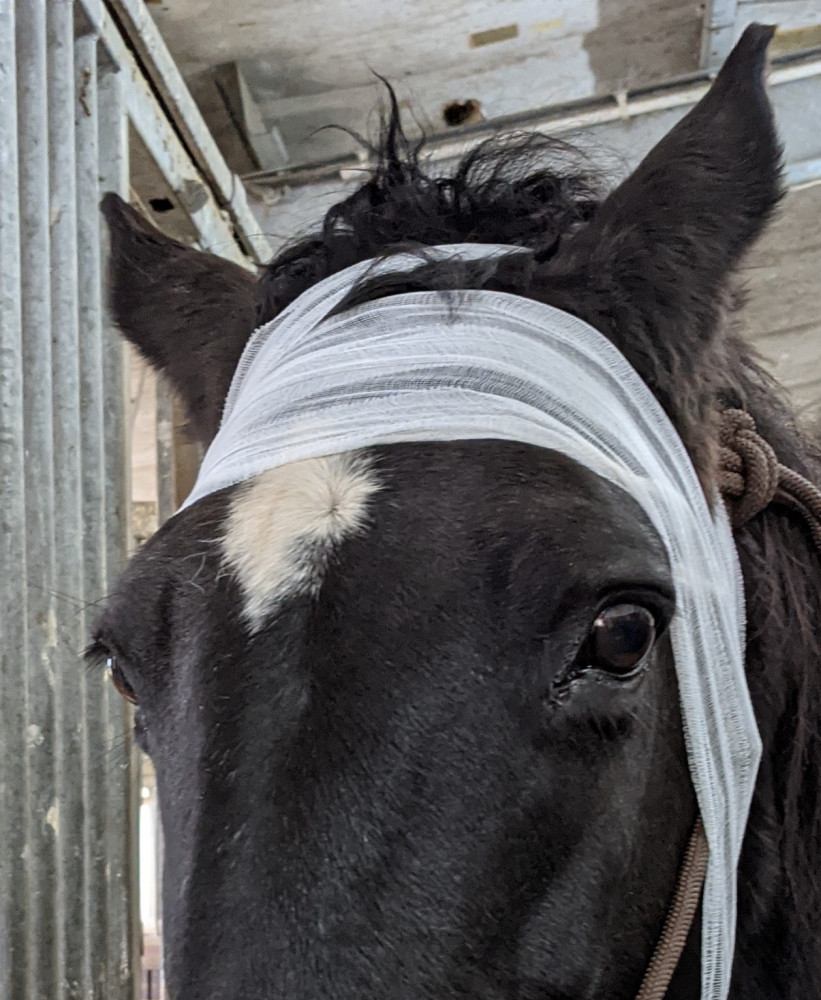Deworming of horses – Information and tips
 After a long winter every horse hungers for the first days on the pasture in the sun.
After a long winter every horse hungers for the first days on the pasture in the sun.
But these pastures are the home of many larvae and parasites that can easily enter and infect the horses’ organism with worms. Only regular deworming, hygiene and special rules in the stable help to avoid a worm infestation.
In general horses need to have a deworming four times per year.
However these four dates a year are not enough to get rid of all parasites and larvae effectively. These small insects are very survivable and persistent so that horse owners need to make use of further prevention measures.
Parasites and larvae have a long way until they finally reach their final destination: the gastrointestinal tract. If they are able to breed and reproduce the infestation leads to a chronic damage of certain organs as well as to colic or a bowel obstruction. A simple deworming is not enough: afterwards horse owners need to make sure that horses cannot get in contact with the dangerous insects. The most frequent origin for a worm infestation is the pasture: With the fresh grass also parasites and larvae can enter the organism. On this way horses mostly eat tapeworms and horse bots. But not only the pasture but also the stable can be a potential place for the parasites: unhygienic stables are a hatchery for giant roundworms and pinworms.
Symptoms for a worm infestation
The health situation and the symptoms depend on the degree of the worm infestation. Generally the horse is in a very bad physical condition and shows a lack of motivation. Additionally the horse can have a dull coat or diarrhea. Many horses lose a lot of weight so that you can see the vertebras. The symptoms of a colic often are associated with the symptoms of an allergic reaction. The exact diagnosis of the vet is crucial for the correct treatment.
Prevention of a worm infestation
In every stable there needs to be a minimum of hygienic standard to prevent a dangerous parasite and worm infestation. This means at least a daily muck out of the horse boxes. Horses that are already affected by a worm infestation excrete larvae so that they are included in the horse droppings on the pasture and in the box. This explains the life cycle of the larvae: Horses eat the larvae on the pasture and then leave their droppings on the pasture. The larvae are back on the grass again so that other horses can easily get infected. Therefore it is crucial that all pastures, paddocks, riding arenas and stables are free of any horse droppings (cleaning procedures once a day!). Additionally the dunghill always needs to be in some distance to all possible horse areas.

The biggest problem of a worm infestation is the danger of infections for other horses. If a new horse enters the stable it needs to be sure that the horse had a deworming at least one week in advance. A small herd size can limit the possible spread of the worms.
A further prevention measure is the mixed grazing method: Next to the horses there are some ruminants like cows and sheep on the pasture. These animals are immune against the parasites so that they can easily eat them without getting any health problems. They simply have the function of a vacuum cleaner: they clean the pasture from dangerous parasites and larvae and protect the horses from a possible infection.
After one horse has the diagnosis of a worm infestation all other horses of the stable need to have a deworming. This collective deworming can only be effective if it takes place at the same time.
If a horse somehow gets infected with the dangerous larvae it takes some time until they run through the whole organism and reach their final destination: the gastrointestinal tract. This time depends on the type of parasite or larvae:
- Bloodworm: 6,5 – 7 months
- Small strongyles: 5,5 – 14 weeks
- Tapeworm: 6-10 weeks
- Horse bots: 8 – 10 months
- Giant roundworm: 10 – 16 weeks
- Threadworm: 10 – 14 days
In general it is always possible to examine the horses’ droppings by the vet so that horse owners can make sure if the horse has a worm infestation or not.
Four dewormings each year
Vets advice all horse owners to make a deworming four times a year. Together with the daily cleaning of the pasture and horse stable this normally is enough to prevent a worm infestation and great health problems. However the right timing of the dewormings is very important for an effective prevention (it does not make sense to do them all in one month!).
The first deworming needs to be done before the first days on the pasture in spring (April, May). It is possible that some larvae of the small strongyles were able to survive the winter period in the intestinal wall of the horse. As soon as the weather becomes warmer the larvae become active and start to breed.
The second deworming needs to be 4 – 6 weeks after the first days on the pasture (May, June). This time the deworming is concentrated on the removal of tapeworms and giant roundworms.
The third deworming takes place directly after the last days on the pasture what means at the beginning of the cold winter period in the stable (September, October). This deworming is only effective if all horses in the stable have it at the same time (otherwise there is a high risk for infections!).
The fourth and last deworming is in November/December: here the horses´ organism gets rid of all warble grubs, tapeworms and giant roundworms.
If horse owners concentrate on these four dates a year they will lower the risks for a possible worm infestation. If you plan an additional vaccination of your horse the deworming needs to be two weeks before the date of the vaccination. Otherwise the immune system can be too weak to deal with both medicinal treatments at once.
Dewormings of foals
If foals are affected of a worm infestation in their first weeks of life this can cause a life-threatening health situation. The thick worms can effect a bowl obstruction or even a rupture of the intestinal wall and the death. Especially the mare´s milk can be the possible origin for an infection of the foal (during the pregnancy the vet already needs to make sure that the mare is rid of all worms!). Then the small horses have diarrhea, cough or a heavy nose run. In case horse owners should not hesitate to make a deworming even in the second week of life of the little foal. Normally special deworming medicine for foals is available. Then the foal needs a deworming every two weeks for the first eight weeks of his life.
A further possible danger for the foals can wait on the walls of the stable and horse boxes. There you can often find giant roundworms which can easily enter the foals’ organism when the small animal begins to lick and nibble everything of his new environment. These types of worms are very infectious so that they can easily spread to all other horses in the stable. If the foal gets infected the deworming needs to take place in the sixth, seventh or eighth week of the horses´ life (then repetition every 6 – 8 weeks).
Useful tips
Normally horses do not show any great resistance against the deworming medicine. However it can be useful to mix the medicine with some yummy treats. For example it may help to dip the syringe with the medicine into apple juice. This makes it sweeter and tastier for the horse. Otherwise you can mix the medicine with wet carrot mash. It is not very useful to try out the apple trick (halve the apple and fill it with the medicine before you close it again and feed it to the horse). Due to all the slobber a lot of the medicine will probably not enter the horses´ organism.
The horse owner needs to consider the right dose for the horse. This depends on the weight and age of the animal. A too low dose can even cause that certain worm species become resistant against some elements of the medicine! To prevent a further generation of resistance of the worm vets advice all horse owners to change the medicine for the deworming every year.
Surf tips:
- Horse colic – origin, symptoms, therapy
- Apples, carrots, sugar beets – useful tips for the right feeding
- Did you know that pears can lead to colic in a horse?
—All statements without guarantee—


One Comment